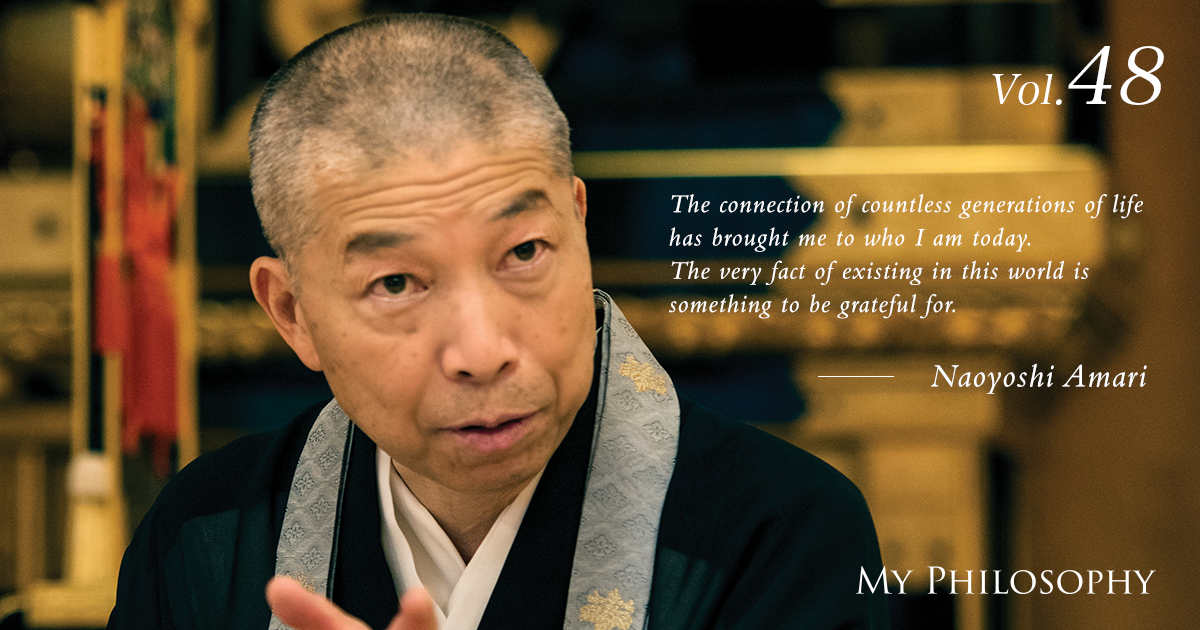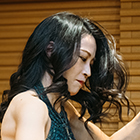
Naoyoshi Amari, the chief priest of the Jodo Sect temple Senshuji and the principal of Senshu Kindergarten, where the children of the editor-in-chief of "My Philosophy" attended, shared his thoughts on human life.
Profile
Vol.48 Naoyoshi Amari
Head Priest of Ichigyosan Senshuji Temple | Principal of Senshu Kindergarten
Born in Tokyo in 1952, Naoyoshi Amari graduated from Keio University's Faculty of Economics and Department of Education within the Faculty of Letters. Aspiring to become an elementary school teacher since his first year of high school, he obtained his elementary school teaching license through the distance learning program at Tamagawa University after completing his university education. He dedicated 24 years to teaching: one year at Toin Gakuen Elementary School, 18 years at Keio Yochisha Elementary School, and 5 years at Seisen Elementary School. At the age of 48, he joined Senshuji Temple, the family temple of his wife.
*The titles and positions are as of the interview conducted in September 2016.
Letting Go of Attachments

Through my years of experience as a teacher, I gradually realized that it was not me teaching the children, but rather, I was learning from them. After 24 years in teaching, I decided to take a year off to absorb new experiences before returning to the classroom. During that year, I thought it might be beneficial to immerse myself in a life connected to Buddhism, but I never considered becoming a monk. When I began my life at Senshuji Temple, I started the initial training to become a monk. It felt as if my pride as a teacher had been completely shattered, and I had entered a world where a frivolous heart could not survive. By the time I completed all my training, I realized that unless I let go of my attachments, I could not live a life that properly conveys the teachings of Buddha.
Everyone has attachments. For example, one might be particular about the tie they wear today, or have an obsession with anti-aging, clinging to youth. These are all forms of attachment. Attachment means being fixated on something. When people have attachments, they suffer. By living a life free from attachment, one can exist in a world of serene tranquility, without any doubts or bindings. I strive to live my daily life aiming for such an existence.
The Suffering of Four and Eight

There is a phrase, “shiku-hakku” (the suffering of the four and eight). It is often misunderstood to mean that there are eight additional sufferings besides the four, but it actually refers to the combined total of these sufferings. The first four sufferings are birth (the suffering of being born), aging, illness, and death. Death is inevitable for everyone and cannot be avoided once born. Recently, the term “shukatsu” (preparing for the end of life) has become popular, but since everyone must eventually die, focusing too much on death can lead to a misguided way of living. About 3,500 years ago, Prince Siddhartha of the Shakya clan in India (later known as Buddha) embarked on a journey to find a way to escape these four sufferings. Eventually, Buddha realized that it is impossible to escape them, marking the beginning of Buddhism.
The other four sufferings are:
Separation from loved ones (aibetsuriku): The suffering of having to part with loved ones.
Encountering the hated (onzoueku): The suffering of having to meet those whom one despises or hates.
Unfulfilled desires (gufutokku): The suffering of not getting what one desperately wants.
The suffering of the five aggregates (gounjoku): The suffering arising from the inability to control one’s body and mind as one wishes.
When combined with the sufferings of birth, aging, illness, and death, these constitute the “shiku-hakku,” or the eight sufferings. It is a state where one is suffering from these eight forms of suffering. Humans cannot escape these sufferings.
Knowing Contentment

Human desire is never-ending. You want something, you obtain it, and then you want more or something else. There are no limits to desire. People need to practice “chisoku” — knowing contentment. At some point, one must realize that they have enough. If you constantly chase after desires without recognizing this, you will eventually lose sight of yourself, stray off course, and face dire consequences. Once humans experience a pleasurable sensation, their brain and body cannot forget it. Pleasure feels good, so people want more and stronger sensations, leading to an endless cycle that can ultimately destroy them.
Desire is the driving force behind our efforts and aspirations, and such feelings are necessary for everyone. A life without any desires would be dull. It is fine to have periods in life where you pursue your desires, but at some point, it is crucial to recognize and control your current state of being.
The Importance of Life

the karma of past lives; jomyo is decided by the combination of past karma and current life’s causes. Daily life includes both good and bad experiences, and things don’t always go as planned. However, think about this: no one can be born alone. The fact that you were born into this world is truly remarkable.
Everyone has parents. Each of your parents has their own parents. Your grandparents also had parents. If you go back ten generations, how many people do you think there are? 1,024 people. If you go back twenty generations, there are 1,048,576 people. If even one of those individuals were missing, you would not exist. The fact that you are here now is due to this invaluable chain of life. Therefore, living in this moment, in this time, era, and place, is a miraculous and amazing thing. Being born as a human is not something to be taken for granted; it is incredibly difficult, precious, and something we must recognize and appreciate.
I feel a mysterious connection to the fact that this is the 48th interview. Amida Buddha, the object of faith in the Jodo sect, has 48 vows—wishes made to become a Buddha. When Amida Buddha was known as Bodhisattva Dharmakara, he traveled to see many pure lands and undertook training. There were both wonderful and imperfect pure lands, which served as references when creating his own pure land. Bodhisattva Dharmakara made 48 vows, fulfilled all of them, and became Amida Buddha. As I am featured in this 48th interview, I have renewed my resolve to strive to become a monk who can be of some help to everyone.

I would like to express my gratitude to Mr. DK Sugiyama for the opportunity to be interviewed this time. It has been about ten years since I first met Mr. Sugiyama. When I first met him, I thought I had never seen someone so full of energy. That overflowing energy remains undiminished even now. Anyone who talks with Mr. Sugiyama will undoubtedly feel inspired to take some new action. That is the kind of person Mr. Sugiyama is.
In my lifelong practice, the connection I have received from him undoubtedly holds great significance. I am truly grateful for it.
Naoyoshi Amari
Head Priest of Ichigyosan Senshuji Temple and Principal of Senshu Kindergarten
I have been deeply indebted to Mr. Amari since my eldest son enrolled in Senshu Kindergarten 10 years ago. All four of my children were under his care during the crucial period of their first 1,000 days (3 years old), and I am extremely grateful for this. Having grown up in New York, I resonated with the educational approach that incorporates a lot of Japanese culture and actively participated in the kindergarten’s activities. I believe I have grown over these ten years by embracing Mr. Amari’s teachings.
Wanting to share the life philosophies I learned from him with a broader audience, I asked him to appear in “My Philosophy” about five years ago. At that time, he promised to participate in the “48th interview,” in line with the age of 48 when he became a monk. This became a milestone, and I have continued “My Philosophy” with this goal in mind. In the interview we conducted this time, I learned the importance of striving towards goals and the new concept of “jomyo.” Since death is guaranteed, I intend to live every day to the fullest, brightly, joyfully, amicably, and positively until the end.
September 2016, at the main hall of Jodo Sect Senshuji Temple.Translated by ILI Inc.



































































































































